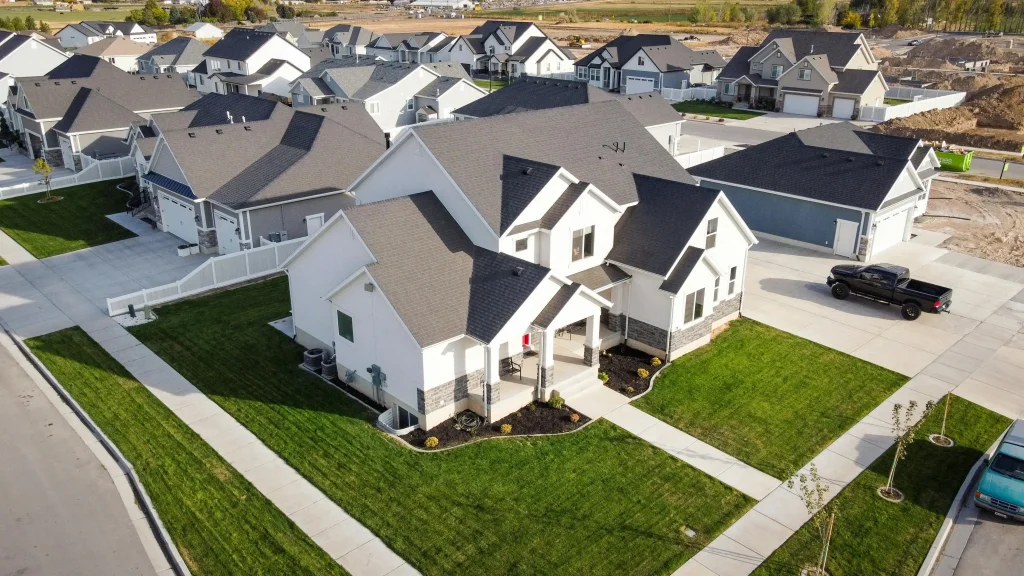A lien gives notice, or gives evidence, that an association has a claim against a piece of property. Statutory liens are an automatic notice of an association’s legal claim against a property for unpaid debts, which are established by law rather than the association taking action. In Georgia, statutory liens can automatically apply when obligations, such as assessments or dues, go unpaid under the Georgia Condominium Act (GCA) or the Property Owners’ Association Act (POAA). Understanding how and when these liens apply is critical for associations, homeowners, and attorneys involved in real estate transactions. These efforts help avoid delays and protect associations’ interests.
What is a Statutory Lien in Georgia?
A statutory lien gives notice of a legal claim against a property as a result of unpaid debts, such as dues, fines, and special assessments. Unlike a voluntary lien, like a mortgage, which is agreed upon by the property owner, a statutory lien is an involuntary lien imposed by law to ensure repayment of a debt. In this context, the debtor is the property owner who owes the obligation. In Georgia, statutory liens are applicable in various scenarios, including unpaid property taxes, federal tax liens, judgment liens, and involuntary liens.
Automatic Liens Under the Condominium Act and POAA
One unique aspect of Georgia law is the automatic nature of certain liens. Under the Georgia Condominium Act and the Property Owners’ Association Act:
- Liens for past due assessments owed to Georgia property owners associations (POAs) and condo associations are automatic.
- The lien is created the moment the payment is past due.
- There is no need for any initial recording or legal notice for the lien to be established.
Statutory liens grant notice of a legal claim against the debtor’s property as security for unpaid debt. The automatic nature of these liens serves as a powerful tool for associations, ensuring public notice that the association has a legal claim on the debtor’s property without needing to go through the hassle of recording a physical paper lien each time a property owner falls behind in payments due to their association.
Additionally, statutory liens enable an association to then obtain a judgment lien against the property owner and an order of judicial foreclosure on the judgment lien. This legal right is crucial for the financial stability of associations, helping to ensure their right to collect the assessments due to fund the common expenses to maintain the community’s property and other financial obligations of the association.
Liens for Homeowner Associations (Must Be Filed)
Unlike property owners’ associations and condominium associations, homeowner associations not submitted to the POAA or GCA must actively file, or record physical paper liens in their county land records to give evidence of their legal claims.
This requirement means that community associations not subject to the POAA or GCA do not have an automatic lien and must take steps to protect their interest in the property of their delinquent homeowners.
Filing or recording a lien protects homeowners associations by providing a clear legal notice to anyone who may have an interest in the property. Filing a lien also ensures that potential buyers or investors are aware of outstanding debts, and that the lien needs to be cleared before selling the property.
This process helps protect the association’s financial health. Every association not subject to the POAA or GCA should have an established procedure to file liens once homeowners fall behind on their assessments.
When Does a Statutory Lien Attach to a Property?
Unlike voluntary liens, statutory liens take effect immediately when a payment is past due:
- When a homeowner misses a payment, the lien is automatically created against the property.
- This automatic action ensures associations immediately give notice of their claim, promptly protecting their financial interests.
The legal basis for these statutory liens lies in the filing of the association’s declaration, which serves as a public record of the association’s right to impose liens. This public notice ensures transparency and provides a clear legal framework for daily operations. This certainty helps both associations and their residents effectively navigate their obligations and rights regarding involuntary liens.
Key Takeaways
- Automatic liens take effect the moment a payment is late; no filing is required if the property falls under the Georgia Condominium Act or the Property Owners’ Association Act.
- Associations not subject to the POAA or GCA must actively file a lien to protect their claim.
- Liens can delay or block a sale, so they must be addressed early in the closing process.
How Statutory Liens Impact a Property Sale
Unresolved liens can negatively affect the parties involved until the debt secured by the lien is resolved, thus impacting the purchase or sale of the property.
Closing attorneys have pivotal roles in managing statutory liens during property transactions:
- A closing attorney must be well-versed in the relevant laws.
- They must proactively contact the homeowner’s association to obtain a payoff statement for any outstanding dues.
- Closing attorneys should also check for judgment liens as part of the property search, as these legal claims must be resolved to proceed with the transaction.
According to the GCA, POAA, and most HOA declarations, a written payoff statement must be requested before each closing of property part of a condominium, property owners’, or homeowners association. This written confirmation serves as a binding record, providing a clear understanding of amounts owed which must be paid at the closing of the property to transfer title. It safeguards the interests of both the purchaser and the association.
Georgia GCA and POAA Payoff-Letter Deadline (5-Day Rule)
Associations are legally required to respond to payoff requests within five days. Associations are obligated to meet this deadline to ensure they collect what is past due from the property owner and ensure that the sale process is not delayed. This allows all parties to proceed with confidence.
Failure to respond within the time frame has significant consequences. If an association does not provide a written response within five days, the closing attorney can disregard the statutory lien, depriving the association of one of its most powerful tools in collecting amounts owed. Timely communication and proactive management are essential to secure the association’s financial interests.
Need to Prepare a Lien Payoff Letter?
If the Property Closes Before the Lien Is Cleared
In some cases, despite everyone’s best efforts, a property may be sold with an existing lien. Even so, the association does not lose its right to the money owed. As long as the association has met its obligations for any payoff request and any other procedural requirements for establishing assessments due, both the Georgia Condominium Act and the POAA state that purchasers are jointly and severally liable with the seller to the association for any unpaid assessments due at the time of closing. Having a lien at the time the sale took place gives the association several options on how to recover the money. The association can:
- Sue the seller
- Sue the buyer
- Sue the seller and buyer together
- Reach out to the closing attorney who missed payment of the lien
- Submit a claim to the owner’s title insurance
This joint and several liability means that both the old and new property owners are responsible for settling all delinquent assessments related to the property. If the debt is not satisfied, the association may have the legal right to foreclose on the property to recover the unpaid amount.
While this may seem drastic, it provides a clear legal path for associations to collect past due assessments. For purchasers, they would have the the right to pursue the seller to recover any amounts they are required to pay to the association that the seller failed to pay.
Understanding assessment obligations and lien rights is essential for both buyers and sellers. It ensures that all parties are aware of how they affect their responsibilities as property owners and helps ensure the parties address any outstanding liens before finalizing the sale.
Lien Priority vs. Mortgages & Judgments
Statutory liens often take precedence over other types of liens, particularly in cases involving special revenues. This priority provides associations with stronger legal standing compared to other liens and creditors. However, federal and state laws may override the association’s claims.
The loan you take out to buy your home always has a first-priority lien position. Under the GCA and POAA, the association’s statutory lien is usually second in line behind the mortgage and ahead of any judgments or other liens.
The priority of statutory liens significantly affects their enforceability. Once a statutory lien is established, no additional notice is required for its enforcement. Associations can act swiftly to secure their claims once the lien is formally attached to a member’s account.
Georgia HOA Lien FAQs
What happens to the lien in bankruptcy?
In bankruptcy cases, statutory liens remain effective on properties acquired after the bankruptcy filing, transforming the association from an unsecured creditor in bankruptcy to a secured creditor. In most bankruptcy cases, a secured creditor is much more likely to be paid than an unsecured creditor. Understanding these nuances helps associations navigate the complex landscape of lien priority and enforcement.
How can an association make sure it gets paid?
To ensure they receive timely payments, community associations should maintain accurate statements of account for each property. Proper record keeping allows associations to track unpaid assessments and take prompt action to secure payment, even if the property is sold. For accounts in collections with NowackHoward, LLC, we provide payoff statements, coordinate with the association, closing attorney, buyer, and seller, smoothing out this confusing closing process for associations.
For associations not governed by the POAA, timely filing of liens is essential. Actively filing liens for delinquent assessments and other amounts owed helps associations give notice of their legal claims and ensure they receive the money owed.
Do statutory liens expire in Georgia?
Homeowners association liens governed by the POAA automatically expire four years after the original due date of the unpaid assessment, meaning the association loses its legal claim if no action is taken within that period.
Need Help with Georgia HOA Liens?
Navigating Georgia’s statutory lien laws can be challenging. NowackHoward offers tailored counsel and advocacy. Understanding the nuances of automatic liens, involuntary liens, and other legal claims requires specific knowledge and experience in legal claims against property.
NowackHoward supports the legal needs of community associations across Georgia. Our experience and knowledge helps ensure HOA and condominium association boards of directors receive accurate advice and effective solutions tailored to their unique community.
Don’t let the complexities of liens, foreclosures, and general collection practices overwhelm you. Get the professional support you need to navigate these matters confidently and protect your community association’s financial strength!


